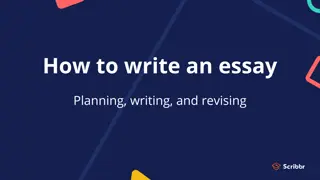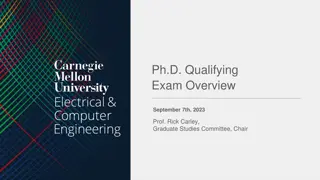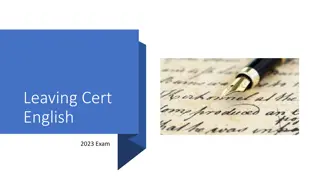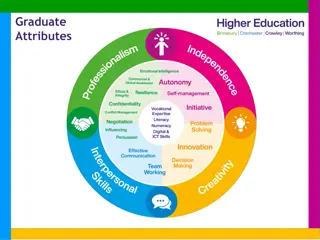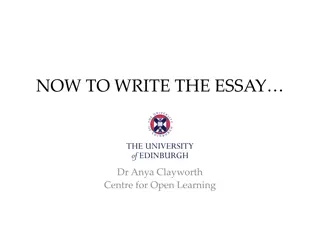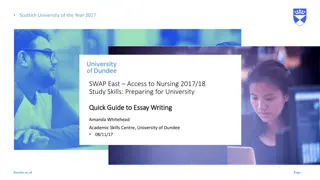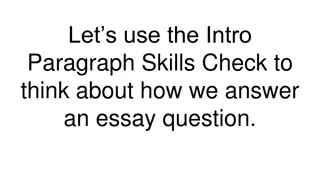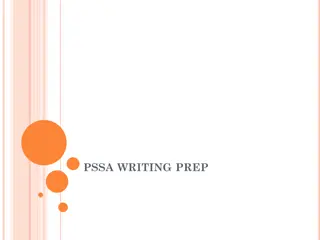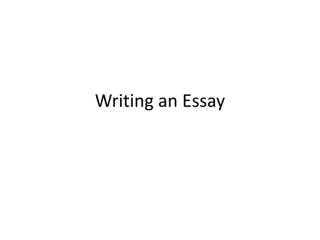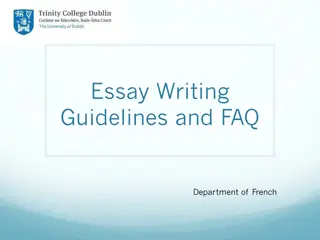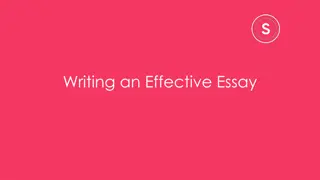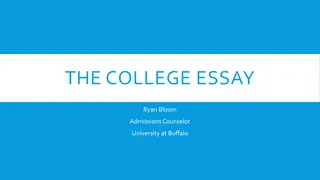Effective Exam Essay Writing Strategies
Preparation is key for essay writing in exams. Start by revising topics, practicing with past papers, and familiarizing yourself with exam formats. Reading the paper carefully, planning your time wisely, and writing essay answers strategically can help you succeed in exams. Utilize a 10-minute essay plan to understand and answer questions effectively.
Download Presentation

Please find below an Image/Link to download the presentation.
The content on the website is provided AS IS for your information and personal use only. It may not be sold, licensed, or shared on other websites without obtaining consent from the author.If you encounter any issues during the download, it is possible that the publisher has removed the file from their server.
You are allowed to download the files provided on this website for personal or commercial use, subject to the condition that they are used lawfully. All files are the property of their respective owners.
The content on the website is provided AS IS for your information and personal use only. It may not be sold, licensed, or shared on other websites without obtaining consent from the author.
E N D
Presentation Transcript
Essay writing in exams www.kent.ac.uk/student-learning-advisory-service
Preparation Preparation In the lead up to the exam you should have: Revised*- topics likely to come up, based on studying past exam papers, topics emphasised by lecturers or related to key module/learning outcomes. *See further Online Bitesize Skills Development sessions on Planning your revision , Revision skills and other exam related topics via the SLAS web pages http://www.kent.ac.uk/student-learning-advisory-service Practised Use past papers to practise answering questions in exam conditions, identify gaps in knowledge, and familiarise yourself with exam formats Practise sitting online exams: Practise modules are in development and, when available, will be accessible via: https://www.kent.ac.uk/guides/online- examinations-2020-technical-guidance-for-students#try-it-out-
Reading the paper Reading the paper Carefully check the instructions (rubric) Choose your questions (if not required to answer them all) Make a time plan (go for the easiest and highest scoring questions first)
Planning your time Planning your time m m Allocate time according to % points value of each essay, e.g: Module Questions on offer You have to answer % for each question Total hours Time per question Comments SE573 8 2 essays 50% 2 1 hr Include time for essay planning, checking and tidying EC302 Section A: 1 Section B: 6 Section C: 6 1 essay 1 essay 1 essay 50% 25% 25% 3 90 minutes 45 minutes 45 minutes Stay on schedule to answer EVERY question required SO300 Section A: 3 Section B: 5 1 essay 2 essays 50% 50% 3 90 minutes 45 minutes (x 2) Avoid substantial duplication in your answers
Writing the exam essay Writing the exam essay Plan time for each answer (depending on weighting) e.g. 1 hour essay - 10 minutes for planning - 45 minutes for writing - 5 minutes for proof reading & editing Check the time: try to stay on target! Keep the title in front of you Write according to an essay plan
10 10- -minute essay plan minute essay plan Choose a question Understand what is required* (2 mins) - Instructional verb e.g. compare - Key phrases (indicating subject/aspect/scope) Brainstorm; list everything associated with topic (4 mins) - Including: ideas, aspects, key points, data, authors, examples, case studies. Group (main themes/points) and set in logical order (4 mins) Check plan against title; does it answer whole question? * For detailed guidance on how to understand essay questions see our Online Bitesize Skills Development session: Considering an essay question
Structure Structure Introduction (*short and succinct only) Link to module Set the scene Interpret the question Outline scope of answer/evidence Main Body (key points) Clear well-structured argument Logical sequence of points Supporting evidence from your reading (inc. names/dates of relevant sources where possible) 4-5 paragraphs with clear topic sentences Conclusion Summary of argument/points made Overall evaluation/judgement
Paragraph structure Paragraph structure Topic sentence (framed as a point) summarises its main idea Supporting information (further explanation/elaboration of the main idea) Supporting information (key example/evidence that supports that main idea) Supporting information (evaluation of that evidence against weaker counterviews) Supporting information (further example/evidence to corroborate the main idea) Conclusion/reasoning (optional: confirming main idea and how evidence supports it)
Topic sentences Topic sentences At the outset of each paragraph these signpost clearly each key new aspect of your answer. They do three things, as shown: Qu: Identify the key factors which determine a person s long- term physical and mental wellbeing. Additionally, (linking with previous paragraph) regular exercise (introducing new topic) is vital to sustaining general long-term health (introducing your idea/argument). According to Brown (2018), exercising for more than half an hour per day
Academic writing style Academic writing style 3rd person (this essay will show ) Telling a story (flowing prose, linking phrases, order of information) Clear academic language (no slang, contractions, emotion) Critical analysis (rather than description) Cite sources (author and date, where possible)
Useful tips Useful tips Double-check, and follow, all instructions Look at weighting, answer strong questions first (easiest/most points) Plan (jot down) and stick to a schedule, so you start all the questions you need to answer Get your main points across first Write legibly (practise beforehand if necessary) Avoid waffle e.g. ( What I mean to say is )
If you get stuck If you get stuck Check your essay plan Re-read title and your answer so far Look-up, relax for a few seconds Move on Do not leave the exam hall, or your online exam, early Keep writing calmly to the end
The last few minutes The last few minutes Finish offincomplete questions (Bullet points plus conclusion, if necessary) Tidy up your script - Delete anything you do not wish to be read Check everything - make any corrections and additions very clear - number/label answers clearly
Further resources Further resources For guidance on the broader range of skills needed to write an essay please go to the SLAS webpages http://www.kent.ac.uk/student-learning-advisory-service where you can: Book a one-to-one appointment with a SLAS adviser Attend a range of Online Bitesize Skills Development sessions which include Structuring your essay main body and Writing paragraphs
Get in touch Get in touch SLAS CONNECT To book an appointment: www.kent.ac.uk/student-learning-advisory-service learning@kent.ac.uk SLASkent KentUniSLAS SLASkent






